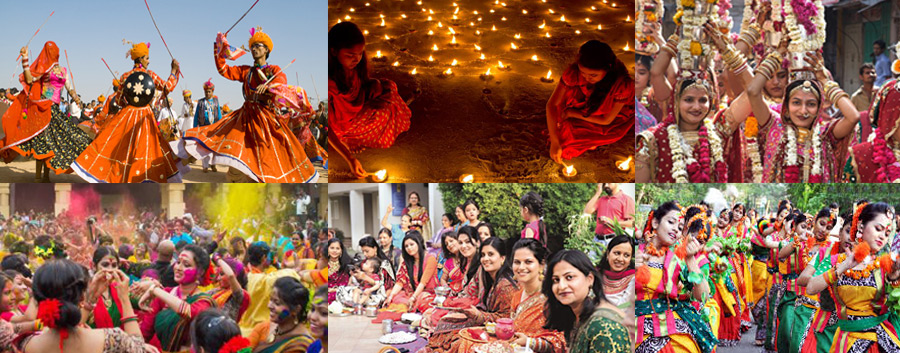Festivals in India

Places Covered: Customized Tour
Welcome to INDIA, popularly knows as a land of Fair and Festivals. The traditional Fair and Festivals enjoy all over by the people of the country.
Republic Day Republic Day is a India's great national festival. The day india became republic (26 January), the republic day is celebrated with a splendid parade a colourful affair with soldiers marching in unison, followed by folk dancers, school children and float from various states.
Shivratri Shivratri means the night of Lord Shiva, is observed in Feb. Annivarsary of Lord Shiva's Tandav(creation) dance,and his wedding anniversary, especially at Shiva temples.
Holi Holi is a spring festival and is a festival of colours, celebrated with enthusiasm. It celebrates the arrival of spring & death of holika, it is a celebration of joy & hope.
Ramanavmi Ramanavmi: Birthday of Lord Rama, the hero of great epic Ramayana, celebrated as a day of great piety, with chanting of prayers. Lord Rama was born on the ninth day of the month of chitra, hence we celebrate his birthday as a 'Navmi'.
Raksha Bandhan Raksha Bandhan: Festival to honour the Sea God Varuna. Brother & sister exchange gifts, sisters tie 'rakhis' or beautifully decorated threads on their brother's wrists. It signifies the brother's responsability of protecting his sister all her life.
Independence Day Independence Day: August 15, commemorates the day in 1947, India's biggest secular celebration, on the anniversary of her independence from British in 1947. Dussehra, Festival in IndiaIt is celebrated all over the country with meetings & flag-hosting ceremonies.
Vijayadashami or Dussehra Vijayadashami or Dussehra
celebrates the homecoming of Rama the hero of the epic Ramayana, after his victory over Ravana, the king of Lanka. In vast open spaces, Ramleela, the folk play with music and spontaneous dialogues, retelling the story of the life of Rama, are enacted till the wee hours. People wash their vehicles clean on this day and decorate the entrances of their homes with torans, flower studded strings, and worship the tools of trade, vehicles, machinery, weapons and even books. Sweets are made. As the evening falls, the villagers cross the border, a ritual known as Simollanghan, and worship the Shami tree.
Dussehra is also reminiscent of the end of the exile and banishment of the Pandava princes in the Mahabharata and their return with their weapons to reclaim their kingdom. In memory of this epic story, people in Maharashtra worship the implements of their professions and distribute the leaves of the Shami tree as gold and express their goodwill.
Diwali or Deepawali means a row of lights, five day festival to celebrate Rama and Sita's homecoming in the Ramayana. It signifies the victory of good over evil. The most beautiful of all Indian festivals, Diwali is a celebration of lights. Streets are illuminated with rows of clay lamps and homes are decorated with rangoli (coloured powder designs) and aakash kandils (decorative lanterns of different shapes and sizes). Christmas, Festival in IndiaDiwali is celebrated with new clothes, spectacular firecrackers and a variety of sweets in the company of family and friends. Dhanatrayodashi; Narakchaturdashi, Amavasya (Laxmi poojan), Balipratipada and Yamadvitiya (Bhaubeej) are the five days which comprise Diwali, and each day has a peculiar religious significance.
Christmas Christmas
began to be celebrated on 25th December, this festival is for the birth of Christ, and is widely celebrated all over world. As every where in the world, in India also the celebration of Christmas has always been, and continues to be, a season time to spend golden moments with family and friends, make new resolutions and receive the much coveted gifts of their choice.
Id-ul-Zuha Id-ul-Zuha is one of the most important festivals of the Muslims. It is called Id-ul-Adha in Arabic and Bakr-Id in the Indian subcontinent, because of the tradition of sacrificing a goat, or bakr in Urdu. It is celebrated from the10th to the 12th day in the month of Dhul Hijjah. The word id derived from the Arabic iwd means 'festival' and zuha comes from uzhaiyya which translates to 'sacrifice'.